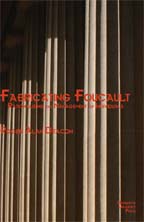38. Fabricating Foucault: Rationalising the Management of Individuals, by Roger Alan Deacon. ISBN 0-87462-661-7. ©2003. Paperbound. Index. 306 pp. $35. Second edition, revised & with a new Foreword, ©2007.
Fabricating Foucault explores the implications of the work of Michel Foucault for the Enlightenment project. It addresses the following questions: Can the modern drive to explain the world so as to guide political action and promote progressive change be defended in the light of Foucault’s critique? How might genealogy rewrite the history of truth when truth structures the very limits of our knowledge? Is it possible to rethink relations of power as strategies of governance which depend on the existence of free subjects capable of resistance? And what is the relationship between the manufacture of subjectivity and Foucault’s call to engage in aesthetic stylistic experimentation upon ourselves?
 “[A] wide-ranging analysis of the work of Foucault …, from Madness and Civilization to the later lectures on parrhesia, … simultaneously challenging criticisms of Foucault as a relativist, fatalist, and pessimist.” ~ Brad Mapes-Martins, University of Massachusetts
“[A] wide-ranging analysis of the work of Foucault …, from Madness and Civilization to the later lectures on parrhesia, … simultaneously challenging criticisms of Foucault as a relativist, fatalist, and pessimist.” ~ Brad Mapes-Martins, University of Massachusetts
“The book can be read and used in a variety of contexts, as an advanced primary Foucauldian text, a specific commentary of Foucauldian critique of the Enlightenment project, a comprehensive round-up of critical Foucauldian notions and ideas, or finally as a tool-box aiding the search of specific aspects and indeed problems and criticisms of Foucault’s work.” ~ Maria Tamboukou, Centre for Narrative Research in the Social Sciences, University of East London
Roger Deacon is Honorary Lecturer in Education and Honorary Research Lecturer in Politics at the University of KwaZulu-Natal, and Managing Editor of Theoria: A Journal of Social and Political Theory.






